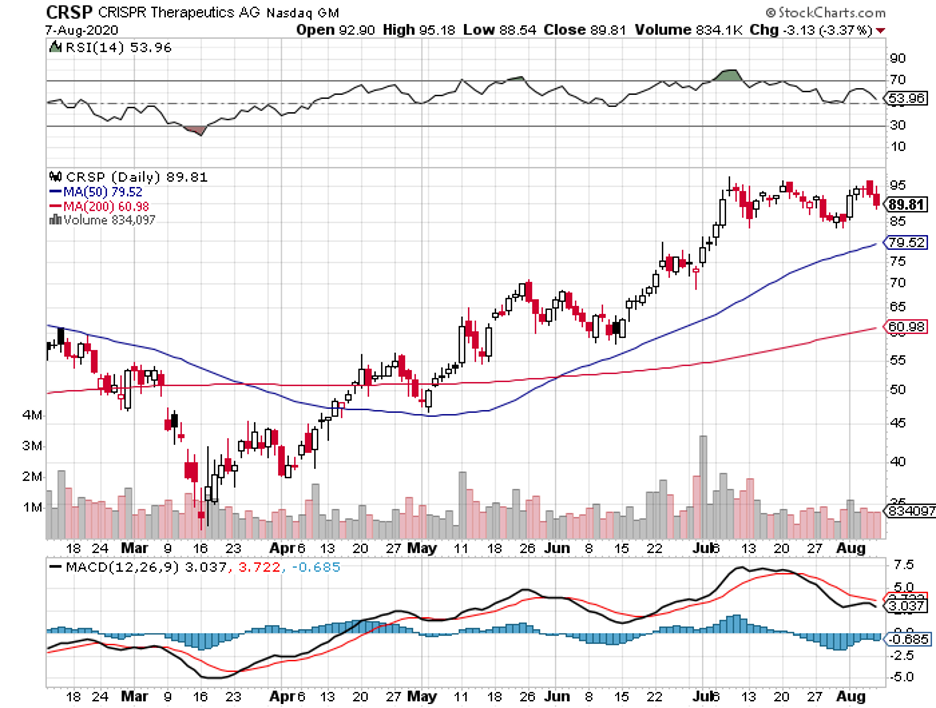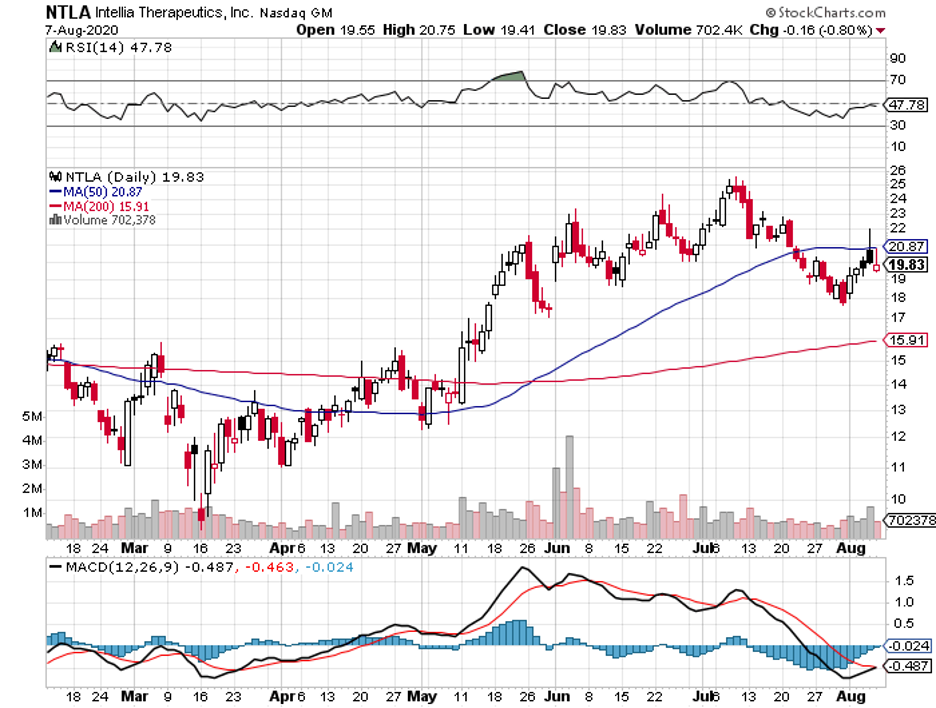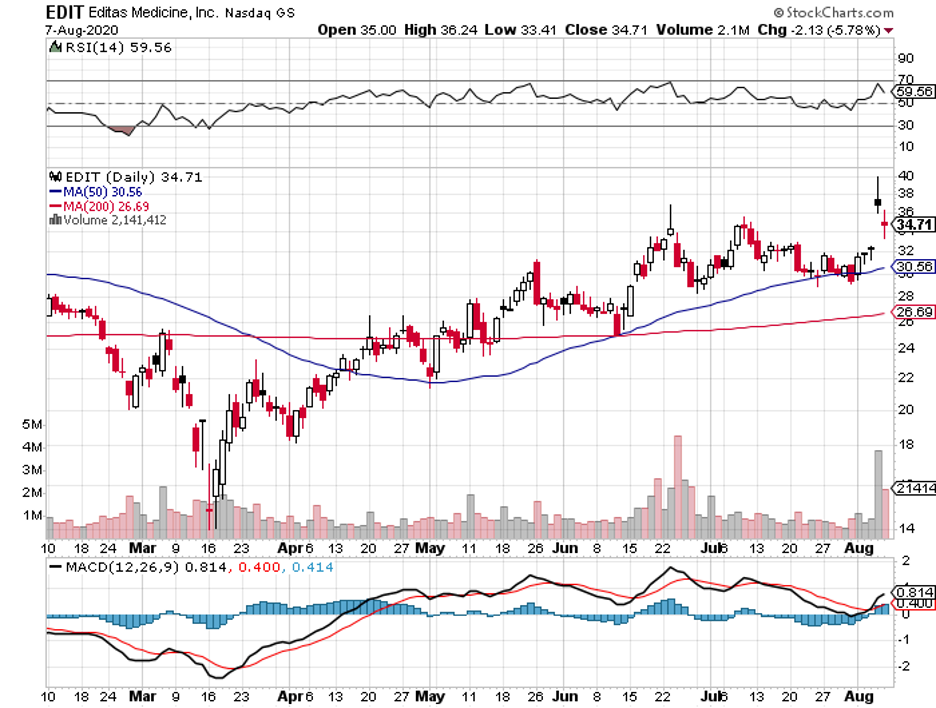The Future of Gene-Editing Therapy
There are wise investments, and there are excellent investments.
CRISPR Therapeutics (CRSP) has been proving to qualify in the latter category.
In fact, the company is considered one of the best biotechnology stocks to own during these turbulent times. It is estimated to dominate the gene-editing therapy market, which will reach roughly $11.2 billion in worth by 2025.
Four years ago, CRISPR Therapeutics stock was trading at $14.09. Today, each share is worth $90.35.
This means that CRISPR Therapeutics biotechnology company has been trading for 540% more than its value since it went public in 2016.
This is a remarkable pace for a biotechnology stock, with CRISPR Therapeutics raking in $289 million in trailing 12-month revenue thanks to strategic collaborations.
It even has a decent $890 million stored in cash, with the company reporting a 16% profit margin despite not having any treatment or drug available in the market yet.
More importantly, CRISPR Therapeutics holds a novel position of being under absolutely zero pressure to push a product out the door.
Nonetheless, the investor confidence in CRISPR Therapeutics relies heavily on the company’s leading position in the groundbreaking world of gene-altering treatments.
Basically, the company specializes in creating and developing therapies for genetic diseases with either no cure available or require frequent transfusions.
Looking at the results of the recent tests on the company’s pipeline candidates, CRISPR Therapeutics is projected to transform into a household name in the next five to 10 years.
CRISPR Therapeutics has five cell therapy candidates in the clinical stage. Three of these target immuno-oncology, while the two are designed for genetic blood disorders like beta-thalassemia sickle cell disease.
Among the five, the most advanced is CRISPR Therapeutics’ collaborative work with Vertex Pharmaceuticals (VRTX) on beta-thalassemia therapy CTX001.
This candidate received a fast-track designation from the FDA, with CRISPR Therapeutics releasing promising preliminary results recently.
However, it is another Vertex collaboration drug that actually yielded CRISPR Therapeutics $25 million at the beginning of 2020.
The drug, which is developed to treat muscular dystrophy disorder, is expected to account for approximately $800 million in future milestone payments in the next few years.
Although the genetic blood disorder programs are raking in millions these days, CRISPR Therapeutics’ cancer treatment pipeline offers an even greater potential in terms of stable revenue streams.
The company is utilizing a gene-editing platform, called CRISPR/Cas9, to create “off the shelf” novel chimeric receptor (CAR) T-cells.
If successful, then CRISPR Therapeutics can use a single batch to treat a broad group of cancer patients.
This is groundbreaking because the typical way involves harvesting T-cells from the patients, tailor-fitting the therapies, then re-introducing the cells to the body.
With this technology, CRISPR Therapeutics can easily cover more markets and offer regular treatments for patients within shorter intervals.
That’s why it comes as no surprise that a major biotechnology player like Bayer (BAYR) reached out to the smaller company for a collaboration.
The CAR T-cell market is projected to hit $8.4 billion by 2027, with an estimated compound annual growth rate of roughly 15%.
Specifically, CRISPR Therapeutics expects this product to become a leader in the solid tumor cancer therapy space, pegged to reach $425 billion by 2027.
However, it is not only CRISPR Therapeutics that is widely known in the gene-editing sector.
To date, the company has two close competitors: Intellia Therapeutics (NTLA), which has a strategic partnership with Novartis (NVS), and Editas Medicine (EDIT), which is working alongside Bristol Myers-Squibb (BMY).
Both are also using the CRISPR/Cas9 technology to come up with treatments.
Although Intellia Therapeutics and Editas went public the same year as CRISPR Therapeutics, neither has performed quite as well.
For perspective, CRISPR Therapeutics currently has a market capitalization of $6.3 billion. In comparison, Intellia Therapeutics has $1.13 billion while Editas Medicine has $2.13 billion.
Keep in mind though that clinical-stage companies, particularly in the biotechnology sector, are inherently risky plays.
Among the companies in the space, CRISPR Therapeutics is emerging to be a solid bet not only from a cash perspective but also based on its strong pipeline and profitable collaborations.
Overall, CRISPR Therapeutics is still considered a high-risk option.
Hence, the safest way to invest is to build a carefully hedged portfolio filled with well-researched gene-editing stocks. This will minimize your risks and guarantee your exposure to the upside in case any of your chosen biotechnology companies makes it to the market with a groundbreaking therapy.




